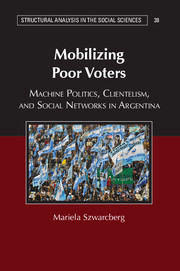Book contents
- Frontmatter
- Dedication
- Contents
- Acknowledgments
- 1 Mobilizing Poor Voters
- 2 The Microfoundations of Political Clientelism
- 3 Building a Party Network: Political, Partisan, and Social Networks in Argentina
- 4 Moral Hazard and Asymmetric Information Networks
- 5 The Logic of Perverse Incentives
- 6 Scaling Up: The Logic of Perverse Incentives at the Subnational Level
- 7 Mobilizing Poor Voters: A Comparative Perspective
- 8 Conclusions: Winners Lose
- Notes
- References
- Index
4 - Moral Hazard and Asymmetric Information Networks
Published online by Cambridge University Press: 05 November 2015
- Frontmatter
- Dedication
- Contents
- Acknowledgments
- 1 Mobilizing Poor Voters
- 2 The Microfoundations of Political Clientelism
- 3 Building a Party Network: Political, Partisan, and Social Networks in Argentina
- 4 Moral Hazard and Asymmetric Information Networks
- 5 The Logic of Perverse Incentives
- 6 Scaling Up: The Logic of Perverse Incentives at the Subnational Level
- 7 Mobilizing Poor Voters: A Comparative Perspective
- 8 Conclusions: Winners Lose
- Notes
- References
- Index
Summary
In 2005, Juan Carlos and Domingo were Argentine Peronist councilors in charge of similarly poor neighborhoods in the municipality of José C. Paz in Buenos Aires. Four days before a party rally with President Kirchner and his wife, Cristina Fernández de Kirchner, who was the candidate for a senate seat in the province of Buenos Aires, the party leader provided Juan Carlos and Domingo with the same number of mattresses, construction materials, and food boxes to distribute among voters. Juan Carlos distributed the goods to voters who were likely to turn out if they received something in exchange. Domingo, however, sent some of his activists to distribute food boxes but sold the construction materials and mattresses to make some extra cash. Although Juan Carlos had mobilized more voters than he would have had he not distributed the goods, on the day of the election, it was Domingo who had managed to turn out more voters than Juan Carlos. Clearly, Domingo's larger voter turnout was not the result of his distributing goods; rather, it was attributed to the fact that his neighborhood exhibited a tendency toward widespread voter participation.
This case illustrates that when voters turn out and vote for the party regardless of receiving benefits in exchange for their participation, candidates’ actions are open to moral hazard. Candidates know voters’ preferences and likelihood to turn out and thus can manipulate that information to obtain more resources from the party boss. Indeed, it is logical to assume that councilors such as Domingo who are able to mobilize voters will charge mayors a commission for delivering goods and mobilizing voters. The challenge mayors face is how to keep from paying candidates too high a commission that their investments in buying support become inefficient.
- Type
- Chapter
- Information
- Mobilizing Poor VotersMachine Politics, Clientelism, and Social Networks in Argentina, pp. 71 - 85Publisher: Cambridge University PressPrint publication year: 2015

